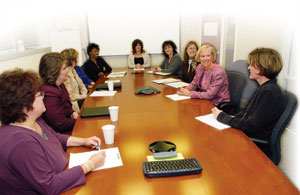 CH2M Hill Cos. Women's interest in engineering education rose only two percentage points in 20 years.
|
Even after decades of effort to increase the number of women in construction industry firms, advocates still lament lack of progress despite often higher math and science test scores among girls.
This month, the Extraordinary Women Engineers Project, a coalition of industry groups organized through the American Association of Engineering Societies, hopes to try to reverse the trend and unlock the mystery of why women shun the field.
Set for launch Feb. 17-23 in conjunction with National Engineers Week in Washington, D.C., is a new initiative dubbed “Engineer Your Life.” It aims to help high school girls realize how engineering can easily fit within their career goals.
The coalition, which has studied girls’ career plans, finds they typically want to make a professional impact, enjoy what they do, earn a living and have flexibility. “When we got responses that girls want to do something that helps people, we realized that the engineering field is not doing the kind of public relations it should relative to what engineering is really all about,” says Pat Galloway, CEO of engineer Neilsen-Wurster Group, Princeton, N.J.
Engineer Your Life aims to provide teachers and guidance counselors with materials to drive home such themes as “change the world,” “make a difference,” “be creative” and “love your work and live your life, too.”
Beth Holloway, director of the Women in Engineering program at Purdue University, West Lafayette, Ind., says the message reflects a realization that outreach and recruiting efforts for future engineers need to emphasize women-specific goals and strengths.
| + click to enlarge |
 |
When the program began in 1969, the philosophy was that simply informing women that they would be accepted in the field would draw them to engineering, Holloway says. From there, the emphasis shifted to trying to “fix” women by teaching them to be more like men in the workplace, she adds. “Really, there’s something wrong with a culture that doesn’t allow women to offer their unique gifts, talents and perspectives in a way that is embraced by everyone,” says Holloway.
Firms also are making a concerted effort to promote talented women to visible positions. CH2M-Hill Cos., Denver, says nearly 30% of its management staff is female, including several board members. “We encourage managers to put women in challenging jobs, because in the long run it makes them much more promotable,” says CH2M Hill President Lee McIntyre.
The company also sponsors a Women’s Leadership Summit to create a network for its global women executives. Now in its third year, the summit is reaching out to employees with eight to 16 years of experience to offer them mentoring. “We want the next generation of women to learn from our experiences and how to use our feminine strengths,” says Joan Miller, a CH2M-Hill senior vice president.


Post a comment to this article
Report Abusive Comment